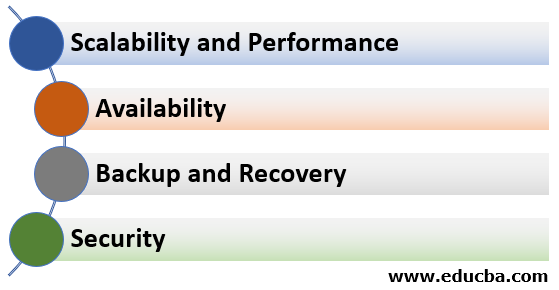Updated May 23, 2023

Introduction to Oracle
Oracle is a product from Oracle Corporation that provides a relational database management system. RDBMS supports any kind of data model. It has different product editions, including Standard Edition, Enterprise Edition, Express Edition, and Personal Edition. The products are scalable and secure, with high-performance ability.
What is Oracle?
Its database is also known as Oracle. It is a multi-model relational database management system mainly designed for enterprise grid computing and data warehousing.
Its database currently comes in five different editions based on the available features.
- Standard Edition One: It is suitable for single-server or highly branched business applications with limited features.
- Standard Edition: It delivers all facilities provided in Standard Edition One. In addition, it provides larger machine support and Oracle Real Application clustering service.
- Enterprise Edition: This edition is packed with security, performance, scalability, and availability required for highly-critical applications in which online transaction processing is involved.
- Express Edition: It is an entry-level edition that is free to download, install, manage, develop, and deploy.
- Personal Edition: It has the same Enterprise edition features except Oracle Real Application Clustering.
Features
An Oracle database offers the following features to meet the requirements of powerful database management:
- Scalability and Performance: Features like Real Application Clustering and Portability make a database scalable according to its usage. In a multiuser database, it is required to control data consistency and concurrency, which Oracle contemplates.
- Availability: Real-time applications require high data availability. High-performing computing environments are configured to provide all-time data availability. Data is available during the time of planned or unplanned downtimes and failures.
- Backup and Recovery: Its layout has complete recovery features to recover data from almost all failures. In the event of a failure, the system must swiftly recover the database to ensure high availability. The unaffected portions of data remain accessible while the affected ones undergo recovery.
- Security: Securing the data is always the top priority. It provides mechanisms to control data access and usage. Implementing authorization and editing, user actions can prevent unauthorized access and allow distinct access to the users.
Importance of Oracle
It is among the oldest companies which provide database management solutions. The company has always focused on Enterprise requirements and acknowledged the latest technology trends. That’s why its products are always embellished with new features. For instance, the latest Oracle database 19C is also available on Oracle Cloud. It offers users to choose from the different database editions that suit their needs to provide a cost-effective solution.
Benefits
We have talked about the features of its database. These features give Oracle an edge over other competitors. Now, we will look at the advantages.
1. Performance: It has methodologies and principles to achieve high performance. We can implement performance tuning in its database to retrieve and alter data faster to improve query execution time and application operations.
2. Multiple Database: Its database supports managing multiple database instances on a single server. It provides an Instance Caging method to manage CPU allocations on a server running the database instances. Instance caging works with the database resource manager to manage services over multiple instances.
3. Editions: As we discussed above, the different editions Oracle offers benefit users to purchase editions as per their application requirements. They can seamlessly update the edition if their requirements change in the future. If you want to learn and do some hands-on Oracle, you can download and install the express edition database, which is free.
4. Clusters: It uses Real Application Clusters to provide a high data availability system. The database with RAC has benefits over traditional database servers :
- Scaling the database over multiple instances.
- Load balancing
- Data redundancy and availability
- Flexible to increase processing capacity
5. Failure Recovery: RMAN (Recovery Manager) is the feature of an Oracle DB which recover or restore the database files during downtimes and outages. It supports online, archived backups and continuous archiving. Users can also use SQL* PLUS for recovery, called user-managed recovery, which is supported by it. There is an export utility available in the database to add user-managed backups.
6. PL/SQL: The database supports PL/SQL extension for procedural programming.
Why do We Use Oracle?
It is a database management software product. A database contains an organized collection of information. A database management system stores the data and provides high-performance, authorized access, and failure recovery features. It provides a software solution that is easy to use and manages database operations, from Personal to Enterprise level applications.
Conclusion
We can conclude that Oracle is a powerful database server management software that can also serve the requirements of Enterprise level and small-level applications. It enjoys widespread usage and encompasses nearly all the features necessary to support modern applications.
Recommended Articles
This is a guide to What is Oracle? We have discussed how we use Oracle, its features, importance, and benefits. You may also look at the following articles to learn more –


